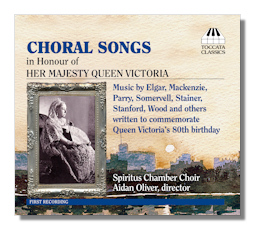
The Internet's Premier Classical Music Source
Related Links
-
Elgar Reviews
Mackenzie Reviews
Parry Reviews
Somervell Reviews
Stainer Reviews
Stanford Reviews - Latest Reviews
- More Reviews
-
By Composer
-
Collections
DVD & Blu-ray
Books
Concert Reviews
Articles/Interviews
Software
Audio
Search Amazon
Recommended Links
Site News
 CD Review
CD Review
Choral Songs in Honour of Her Majesty Queen Victoria

- Frederick Bridge: For all the wonder of thy regal day
- Henry Walford Davies: Hark! The world is full of thy praise
- Edward Elgar: To her beneath whose stedfast star
- Arthur M. Goodhart: Lady on the Silver Throne
- Charles Harford Lloyd: A thousand years, by sea and land
- Alexander Campbell Mackenzie: With wisdom, goodness, grace
- George Martin: The seaboards are her mantle's hem
- Walter Parratt: The Triumph of Victoria
- Hubert Parry: Who can dwell with greatness!
- Arthur Somervell: With still increasing blessings
- John Stainer: Flora's Queen
- Charles Villiers Stanford: Out in the windy West
- Charles Wood: A Century's Penultimate
Spiritus Chamber Choir/Aidan Oliver
Extensive notes by Lewis Foreman,
in English, German and French. Texts of songs.
Toccata Classics TOCC0012 2009 53:20
To celebrate the 80th birthday of Queen Victoria in 1899, this collection of part-songs was commissioned and published by Sir Walter Parratt, Master of the Queen's Music, in collaboration with the poet Arthur Benson. The thirteen composers including Stanford, Parry, Elgar and Stainer, among others, representing the British musical establishment of the day. This recording would seem to give a clear representation of the English choral tradition at that time, and this fact constitutes much of the interest of this release. Some of these composers were heard at the Leeds Festival or the Three Choirs Festival. About half of the composers taught at the Royal College of Music; others taught at Oxford or Cambridge; they included teachers of Vaughan Williams and quite a number of other British musicians over the course of more than one generation. Several contributors were organists – at Westminster Abbey or St. Paul's Cathedral, for instance; others are known mainly for composing church music. A couple of the poets became Poet Laureate, notably Robert Bridges, who wrote words set by Parry, Stanford, Holst and Finzi; another was the queen's son-in-law.
The idea behind this collection was to repeat the kind of tribute to Queen Elizabeth I, three centuries previous that Thomas Morley published as "The Triumphs of Oriana," a collection of madrigals by various Elizabethan composers (currently available on a recording by the king's Singers.) Some of the works here are styled madrigals. Others are hymn tunes. Most of them are polyphonic, some written in six parts, as with divided sopranos and basses. They tend to be dominated by high voices and the writing is mainly legato. The professional choir here is small, in contrast to the first (partial) performance for Queen Victoria, which was sung by 250 voices. Some of the effects would certainly be different with a large chorus. All of the songs are unaccompanied.
I want to say that the music is generally quite genteel-sounding, even though often vigorous, and it might best be heard a few songs at a time, as it was a century ago by Victoria. Hopefully she enjoyed it. (Recently my own traditional stereotype of her was happily modified in a visit to the Queen's Collection at Buckingham Palace, then featuring the personal collection of Victoria and Albert. It prominently included some fine large classical paintings of nude groups which Victoria was pleased to present to Albert as birthday presents, one of which then hung over his desk.)
My favorite piece on the disc is the song, "Who can dwell with greatness!" by Sir Hubert Parry, with text by Austin Dobson. In just a little over three minutes it is varies betwen quiet song, with pastoral imagery, and what the commentator calls a scherzo passage. A nice piece.
Recommended for its historical interest as well as the fine singing.
Copyright © 2010, R. James Tobin





















